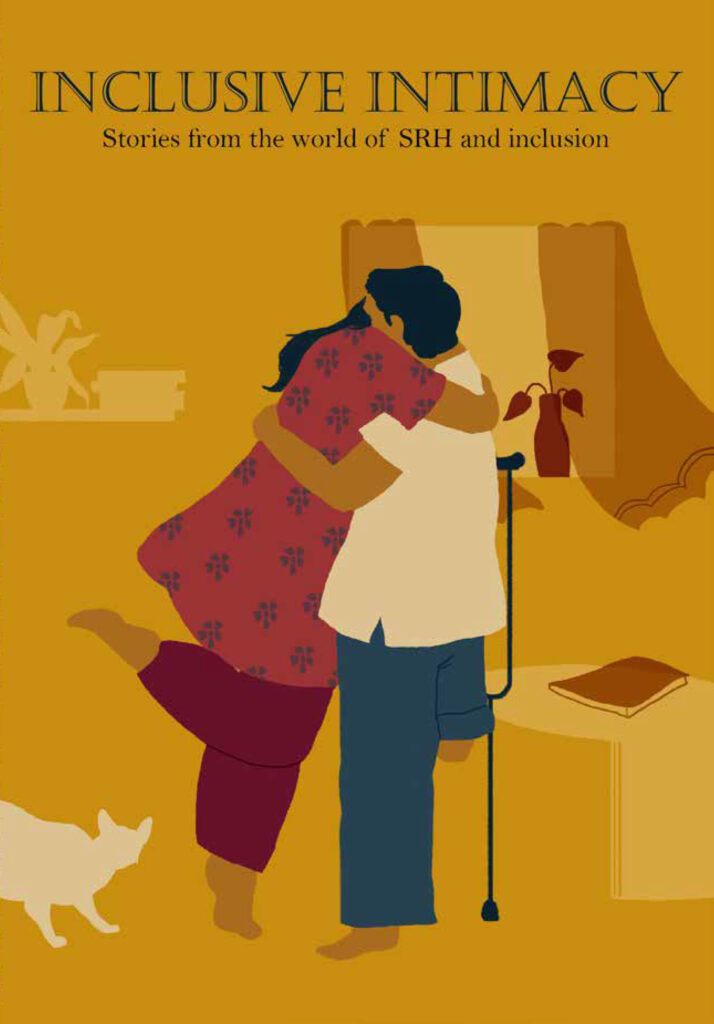Historically, persons with disabilities have been regarded by society in two contradictory ways – either as asexual or as sexually threatening. By and large, their sexual desires are assumed to be non-existent. In this environment that is not particularly enabling, how do people with disabilities conceptualize, experience and engage with themselves as sexual beings? In addition to the specific constraints imposed by a particular disability, the contexts of culture, socialization, socio-economic class, gender, caste and other specific locations make the situation more complex. People with disabilities are systematically denied access to knowledge about sexuality, sexual behaviour and services leading to their sexual marginalization. It is important to acknowledge this reality and address these concerns and not continue to be silent around them.
To address this intersection between sexual and reproductive health (SRH) for people with disability (PWD), CMAC initiated a communications campaign.or the campaign.
Radio Series
CMAC helped conduct a radio series with various community and private radio channels, dealing with issues on SRH. The radio series were directed towards the Hindi-speaking belt of North India, largely. Disseminated through mainstream radio in cities like Gwalior, Kota and Jalandhar, the program was well received since.
Needs-Assessment and Consultation
Thereafter, CMAC carried out a report to assess the available content on sexuality and disability, and outline the needs of the community through a survey. This survey was conducted with over 250 students and about 60 service providers. These students and service providers were from various organizations like the National Association for the Blind, National Association of the Deaf, Noida Deaf Society, Prabhat, Blind People’s Association, Yes! We Can and some independent volunteers. A total of ten organizations were part of the study. For the purposes of the project, CMAC was, and is, also simultaneously in conversation with communication experts from organizations such as National Institute of Design, independent film-makers and digital content developers, who had expressed interest to collaborate with CMAC in creating the communication tools.
In an effort to take the project into the next critical phase of content creation, CMAC reached out to various organizations, NGOs and centers working in the realms of sexuality, disability or both (many of which CMAC was already working with) to meet together. The objective of this meeting was to present the needs-assessment report, discuss possible communication strategies, media-based interventions, and explore synergies and collaborations of working. The focus of this discussion was to think about suggestions, recommendations and possible challenges in the process of creating communication tools for PWD on SRH. The meeting also screened a short video which showcased many PWD and representatives from organizations working on issues of SRH or/and disability.
Inclusive Ishq
Inclusive Ishq is an ongoing flagship social media campaign by CMAC. It is part of our initiative on SRH and Inclusion and aims to facilitate conversations about sexuality and disability.
The primary medium of dissemination is Instagram, which enables interactive methods of communication. We follow a format that encourages questions, feedback and responses to our posts.
We aim to create a safe space to talk about sex and sexuality- a space that can be used to to get information that is sourced from professionals in the field, in a simple and easily accessible manner. https://www.instagram.com/inclusive.ishq/?hI
Inclusive Intimacy
An anthology of 20 stories endeavored to destigmatize and document the intimate experiences of individuals with disabilities.

Over the course of six months, CMAC embarked on a transformative journey under the project “Sexual Health and Reproduction (SRH) and Inclusion,” reaching out to individuals with physical disabilities from diverse backgrounds, including varied classes, castes, regions, ages, and genders. This initiative aimed to uncover and document their intimate experiences with sexual health and reproduction, often shrouded in taboo and misconception. We delved into the lives of young girls navigating menstruation, disabled couples exploring sex, pleasure, and pregnancy, and teenagers and young adults trying to understand their changing bodies. By interviewing individuals with hearing and speech impairments, visual impairments, transgender persons with disabilities, people using wheelchairs, and those affected by conditions such as cerebral palsy, polio, scoliosis, and others—we aimed to challenge the notion that pleasure, love, and romance are off-limits to people with disabilities. This project highlights the universal nature of human desires and emotions. The interviews and text were conducted and crafted by Apurva Dutta.
Additionally, our anthology, comprising twenty stories spanning around 60 pages, and vivid illustrations by Purvi Rampuria, is more than a collection of narratives; it is a catalyst for change. These visually appealing graphic illustrations bring to life the appearances, attributes, and environments of our subjects, making their lived realities accessible and comprehensible to all. This resource is invaluable for policymakers, offering deep insights into the everyday challenges faced by individuals with disabilities, and aiding in the creation of inclusive policies. NGOs can utilize this compilation to enhance their efforts in supporting marginalized communities. Additionally, it provides parents of children with physical disabilities with guidance and solace, helping them navigate the complexities of raising their children in a world that often overlooks their worth. Ultimately, this project is a call to action for society to foster empathy, understanding, and collective action in the pursuit of a more equitable and compassionate world.